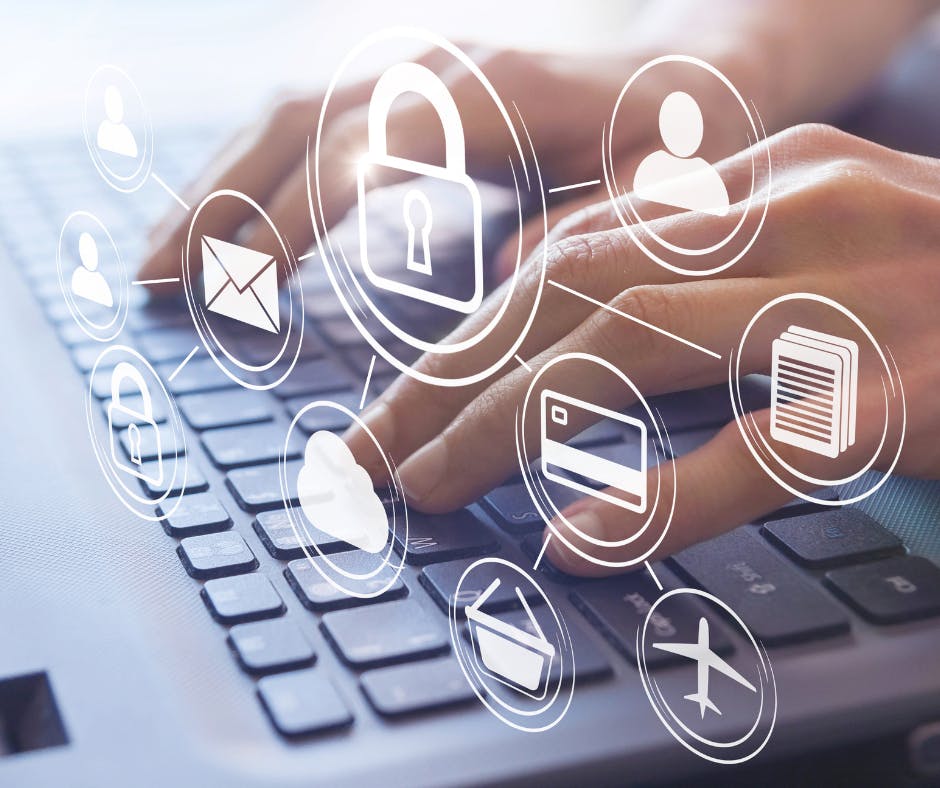As healthcare professionals, safeguarding patients’ confidential information is of the utmost importance. In today’s world, countless hospitals and medical systems rely heavily on internet access to function properly. With more people involved in patient care than ever before, it’s essential to be able to quickly gather and share information among treatment teams without compromising security.
That’s why choosing an effective file-sharing solution is key. The right file-sharing system should maximize team efficiency, protect sensitive data, and maintain confidentiality at all times to ensure compliance with all healthcare rules and regulations. By doing so, you’ll ensure your organization remains secure while still providing quality care for those who need it most!
File Compliance in the Healthcare Field: HIPAA
One of the primary considerations when handling protected health information is adhering to HIPAA regulations. Established in 1996, this federal law dictates how those working with confidential patient data must handle it securely. This applies not only to physical security but also to electronic protection.
The purpose of HIPAA is twofold: ensuring a seamless exchange of medical information among healthcare providers while preventing unauthorized access or disclosure. To guarantee full compliance with these rules, there are several key steps that need to be taken:
- Ensure availability and confidentiality as well as integrity for all PII (Personally Identifiable Information).
- Quickly detect any breaches and establish measures against future threats.
- Train staff on best practices regarding sensitive information storage and sharing protocols.
When dealing with any data containing personally identifiable characteristics such as name, date of birth, contact information, financial information, and social security numbers, proper security measures must be implemented to ensure patient privacy. A violation of HIPAA rules and regulations could lead to major fines and sanctions while also harming the confidence that patients have in the healthcare system.
Hackers Target Patient Information in the Healthcare Field for a Number of Reasons
Hackers are increasingly targeting patient data for several reasons, but financial gain is the most common. With hospital visits come a plethora of sensitive information like credit card numbers and bank account details that can be used to commit identity theft. It’s critical to safeguard this type of information from malicious actors so your patients don’t fall victim to fraudulent activity.
Unfortunately, hackers may also have ulterior motives beyond just financial ones, such as embarrassing or exploiting someone based on their condition when they visited the hospital. To protect against this risk, you must ensure all confidential patient data remains secure at all times; failure to do so could have serious consequences for those affected by it.
Keeping Files Safe and Ensuring Compliance in Healthcare: The Top Tips
When dealing with sensitive medical information, it is critical to ensure its security. To that end, a few key tips for healthcare file management include:
1. Encrypt All Files: End-To-End Encryption
HIPAA regulations require encryption of all files to make them unreadable by unauthorized individuals. Encryption should be applied at both ends of a transfer—the origin and destination—as well as during transit time. This level of encryption will provide an extra layer of protection.
There are different levels of encryption, and if you use a consumer-grade file management platform, you will not get access to the level of encryption you need. Instead, it is critical for you to rely on a professional service that will provide your documentation with the strongest level of encryption, ensuring that all of your confidential information, as well as the confidential information of your patients, is properly protected.
2. Implement Granular Permissions
Using granular permissions is a great way to protect your confidential information. You don’t have to give everyone access to every file on the server. In fact, it’s better to only allow people access if they need a specific document for their job. This doesn’t mean that you don’t trust them, but rather, it allows you to be cautious and hedge against potential risks. After all, what happens if someone steals that person’s password? You don’t want the hacker to immediately gain access to every file on the server.
SmartFile provides an effective solution here. You can create user roles and assign precise permissions accordingly. Of course, this means ensuring users only get the files they require in order to operate efficiently and effectively within their role. Allowing anything more than necessary increases your vulnerability unnecessarily.
3. Train Your Employees Properly
Your files are only as safe as your least educated employees, so it’s essential to provide regular training. Highlight the importance of physical security, phishing attacks, HIPAA regulations, and password hygiene. Explain why these topics matter. Shredding confidential documents is necessary for privacy, cyber attackers attempt to steal usernames & passwords remotely, fines & sanctions may be imposed if laws aren’t followed, strong passwords should be used, and passwords should be changed periodically. This will help reduce the risk of any sensitive data being leaked or compromised by staff members who don’t understand their responsibilities. Investing in employee education now could save you a lot of trouble later.
4. Implement Strong Password Measures and Enforce Good Hygiene
It’s essential for everyone in the healthcare industry to use strong passwords and keep their files secure. Most people don’t realize they can protect links and attachments with a password too. To make sure you’re always safe, create an extra layer of protection on important documents by using a tool such as SmartFile. Here are some tips when creating your password:
- Make it long enough, so it’s difficult to guess
- Include uppercase letters, lowercase letters, numbers, and special characters
- Don’t leave your computer open or someone could gain access to your account
A strong password is key in protecting sensitive information. Good password management tools are essential at work, and it’s important to ensure that everyone follows the rules. To make sure passwords are secure, require employees to change their passwords on a regular basis. For instance, make them change their passwords once every month or three months. It’s also smart to avoid allowing people to use old passwords. This can be done by implementing a policy that restricts anyone from using the same password within the past year.
By changing their passwords often and prohibiting them from repeating old ones, you’ll help protect your company against breaches caused by stolen credentials, which many people don’t even realize has happened until it is too light. Taking proactive steps like these will go a long way toward keeping your information safe.
5. Track All Activity on the System With Proper Notifications
SmartFile is a powerful tool that can help you comply with government regulations and protect your data. It allows you to monitor who’s accessing sensitive files, when they do so, and how they use them. This feature can give patients more trust in your system by showing that their confidential information is secure from snooping eyes. Additionally, it helps reduce the risk of costly fines if someone attempts to access restricted records without authorization.
To ensure maximum security for all users’ data, SmartFile also offers audit tracking capabilities which allow you to review any internal activity or changes made over time. For example, if there are high-profile individuals being treated at a hospital, such as celebrities, this extra layer of protection prevents anyone from illegally prying into their medical history without consequences.
6. Implement Two-Factor Authentication
Two-factor authentication is an effective way to keep your confidential files safe. After someone has entered the first set of credentials, you can require them to provide a second form of verification. This may be in the form of a text message code that’s sent to their phone or another method like biometrics.
Although it can be inconvenient at times, two-factor authentication helps protect against unauthorized access if someone’s username and password get stolen. It adds an extra layer of security so that only those who have been granted permission are able to view sensitive documents or information.
Take Full Advantage of SmartFile’s Benefits in the Healthcare Field
If you’re looking for a system that complies with the latest HIPAA regulations, make sure to check out what SmartFile has to offer. Our solution provides numerous advantages that can help your business succeed, including:
1. Granular User Permissions, Access, and Controls
One of the biggest perks of using our service is its unparalleled access control capabilities. With granular user roles and permissions, you’ll be able to give each individual only the files they need in order to do their job, without having to worry as much about security breaches if someone’s credentials get stolen. You also have full flexibility when it comes to changing these restrictions as job roles change.
2. Control Access To Restricted Files
Data breaches are a serious issue that can have severe consequences. Internal sources pose the greatest risk, resulting in compromised patient medical records and hefty fines for companies that fail to protect themselves properly. To minimize your potential risk, you need a comprehensive security program in place.
At SmartFile we offer just that: robust security measures tailored to fit your needs, so you can safeguard what matters most. With us at your side, rest assured, knowing data breaches won’t be an issue any longer!
3. Have Access to a Paper Trail
If you want your business to meet the standards set by HIPAA, it’s essential to have a system in place that can trace who is viewing what files and when. Comprehensive audit logs and visual analytics tools are key for keeping track of any potential unauthorized access. That way, if someone believes there has been an inappropriate breach of privacy, they can immediately investigate by checking out who accessed the file, from where, at what time, how long it took them to open it, or other documents they may have opened as well.
You also get detailed insights into which records are being seen more frequently than others; whether people are using their own devices or another person’s; and even how long each document was viewed before closing again. This information helps you manage resources effectively so that everything runs smoothly according to the law.
4. Failover Security
Enhance your company’s data security and simplify employee access with a hybrid hosting solution. SmartFile can help you make the most of this option, so all personnel have hassle-free access to their necessary files while keeping them safe from external threats. Our powerful on-premises service will speed up internal connections while our cloud system ensures reliable disaster recovery planning and maximum external protection. You can trust us to keep your business running without draining resources or compromising safety!
5. Customizable Benefits That Meet Your Needs
SmartFile offers an incredible hybrid file management system that comes with a host of benefits. From setting up email notifications to mapping cloud accounts, you can take advantage of all the features and functionality this comprehensive system has to offer. You’ll also be able to back up your data securely in the SmartFile Cloud while giving external users access through a branded web portal. Plus, regular updates ensure any vulnerabilities are addressed quickly before they can become an issue. You also get access to secure file transfer for large files, file versioning, and a comprehensive history of file and user activity notifications. This includes HIPAA compliant activity logs, which you can view at any time.
Partner With SmartFile for All of Your Healthcare File Safety and Compliance Needs
At SmartFile, we understand the importance of secure file management and sharing when it comes to hybrid healthcare files. That’s why we strive to stay up-to-date on the latest digital security developments so that you can rely on us for a comprehensive service. We make sure our solution is easy to use with various access methods while still protecting your data, safeguarding both patient privacy and employee trust in you!
If you’re looking for an efficient way to manage your hybrid healthcare files with secure file sharing, get in touch with us today. Our system has been designed with convenience and safety in mind, offering storage for unlimited file sizes, ensuring that all your information remains safe from harm. Let SmartFile help take care of everything—contact us to learn more!


